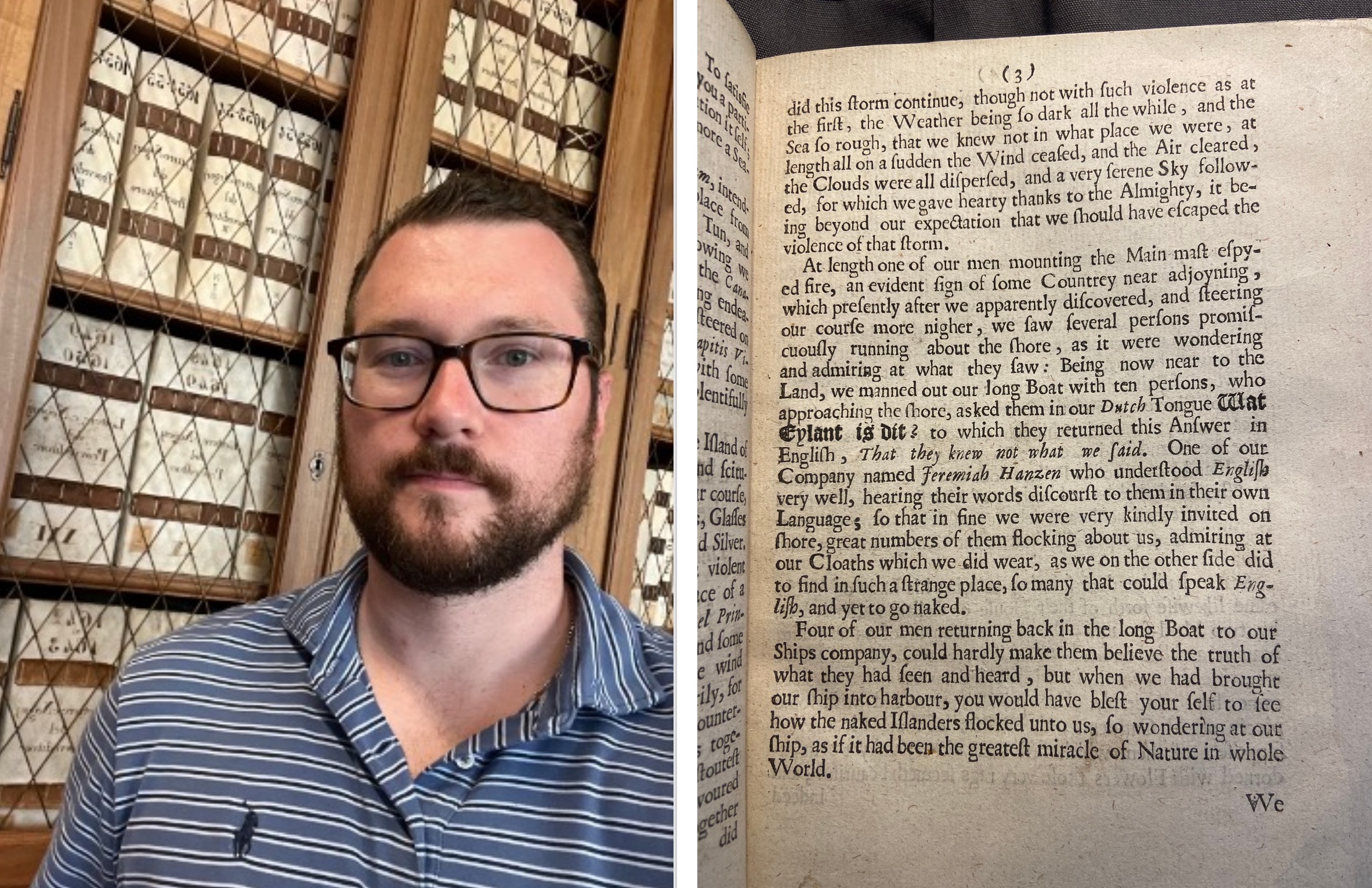Dylan Lewis Named to Andrew W. Mellon Society of Fellows in Critical Bibliography
April 22, 2024

The prestigious fellowship is a capstone graduate career achievement for the English doctoral candidate.
By Chloe Kim
English doctoral candidate Dylan Lewis has been named to the Andrew W. Mellon Society of Fellows in Critical Bibliography, a prestigious community of scholars housed at the Rare Book School at the University of Virginia. The Rare Book School is a renowned hub for the study of texts and books as material artifacts.
Lewis researches 17th- and 18th-century Anglo-German print history, queer bibliography and hands-on pedagogy, which includes teaching in BookLab. His current work primarily focuses on typography, or the study of letters and type, where he analyzes the significance of blackletter—also known as Gothic script, most commonly seen now in newspaper mastheads—in early modern Anglophone print culture.
Through the fellowship, he will receive access to resources such as professional networking, exclusive annual research symposiums, free courses at the Rare Book School, and funding for travel, research and conference expenses. Lewis called it a “lifelong honor.”
The school “is the go-to place for learning about rare book cataloging in libraries and archives, handling rare books, rare book conservation and bibliographical methodology,” Lewis said.
Members of the society undergo a rigorous, highly selective admission process and are widely recognized among peers as leaders in the bibliography field. Out of hundreds of applications and approximately 20 to 25 finalists, only 10 are chosen each year to join the society. They include librarians, archivists, curators, doctoral candidates, independent scholars and faculty members.
Newly named fellows are “junior fellows” for the first two years, during which they are expected to host a conference, take two Rare Book School courses and participate in two annual meetings, which are all funded by the fellowship. After meeting the requirements, they become full fellows for life.
Lewis credited his education at the University of Maryland and his experience in BookLab specifically as providing the training necessary to complete a successful application as a graduate student. BookLab is the Department of English’s makerspace, which hosts classes, workshops and other activities centered around letterpress printing, book history and book arts.
“BookLab has really been my home to explore a lot of what I’m interested in,” Lewis said. “We refer to it as a ‘mini Rare Book School’: we have a teaching collection, we do hands-on work where students learn how to study hand press-era books. It’s invaluable for people who are interested in book history, and we have so much here for exploring that.”
Matthew Kirschenbaum, Distinguished University Professor of English and co-director of BookLab, called the fellowship “the capstone to [Lewis’] professional development.”
“To have Dylan advance to this level speaks volumes about his extraordinary scholarly profile, the depths and promise of his research, and the professional profile he has built for himself in the bibliography and rare books community, as well as the kind of training and preparation available here at Maryland,” Kirschenbaum said.
Lewis plans on enrolling in a course with the Rare Book School this summer that will take place at the Newberry Library in Chicago, which holds one of the premier typography collections in the world. Next year, he hopes to host an interdisciplinary conference at the University of Maryland that brings together typographical experts from fields including literature, history, library science, and communications and marketing.
Image provided by Dylan Lewis. From Henry Neville’s 1668 “The Isle of Pines,” which uses blackletter typography to illustrate Dutch speakers in contrast to the roman type used to represent English speakers and the English text. (The Isle of Pines, or, A late discovery of a fourth island near Terra Australis, Incognita. Neville, Henry. Shelfmark 838.d.24. Courtesy of the British Library.)

